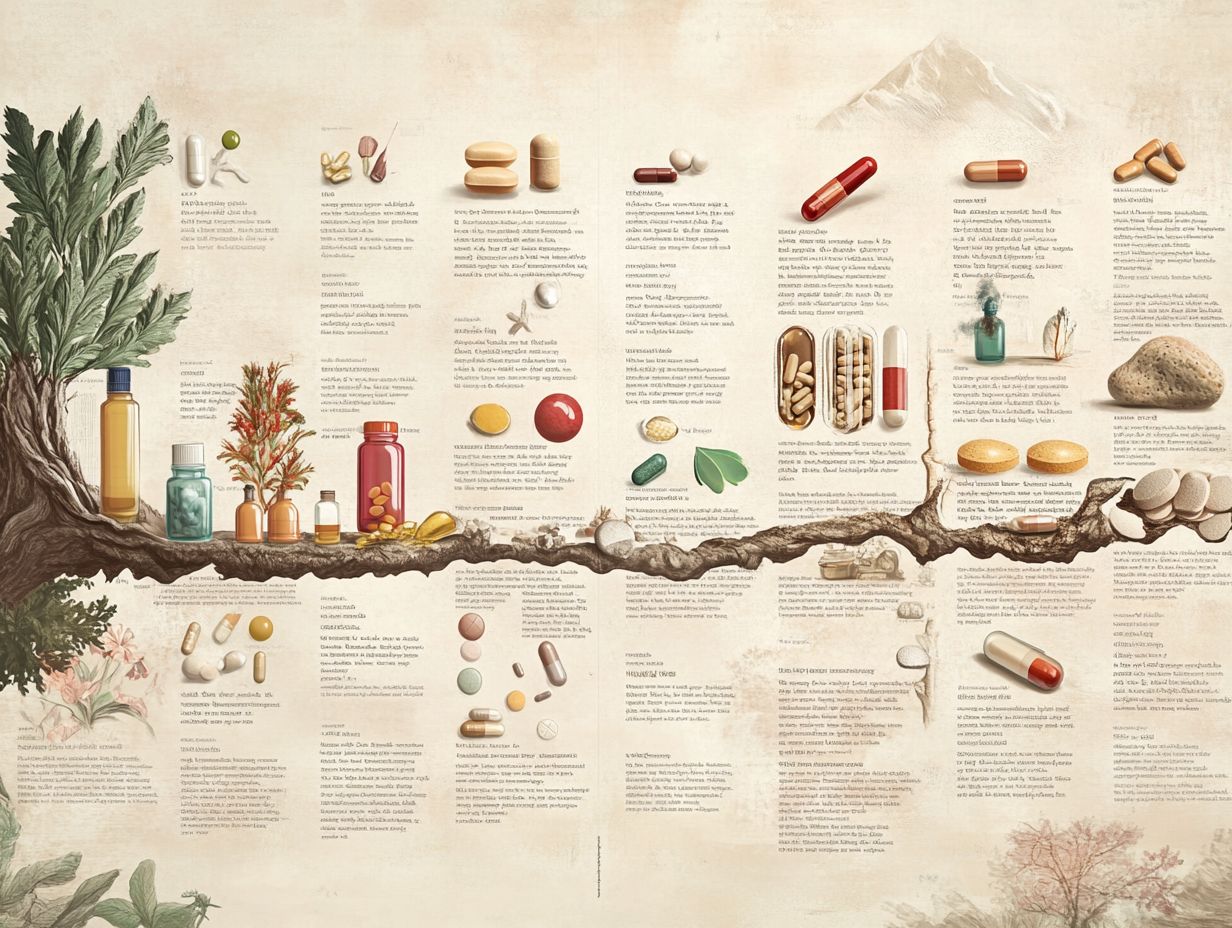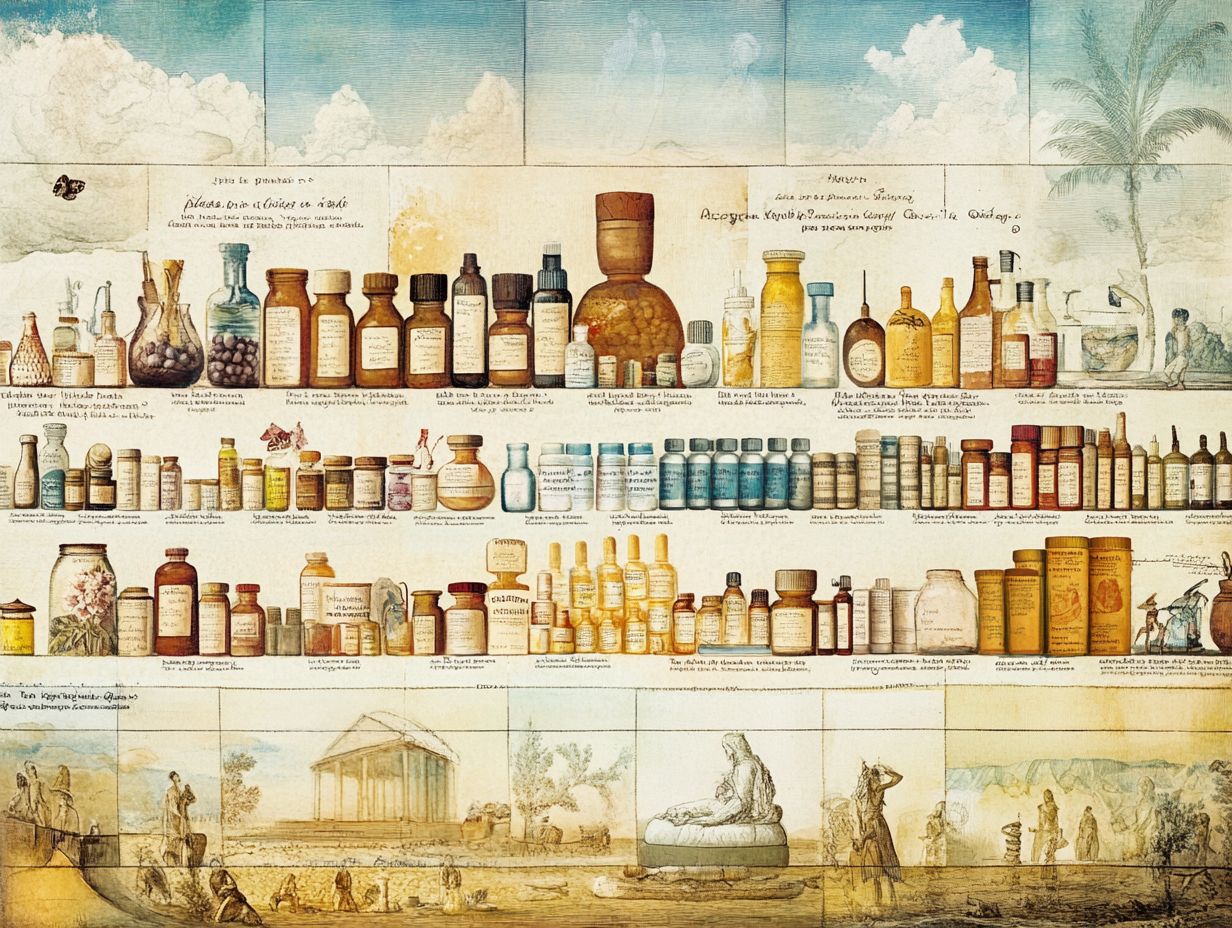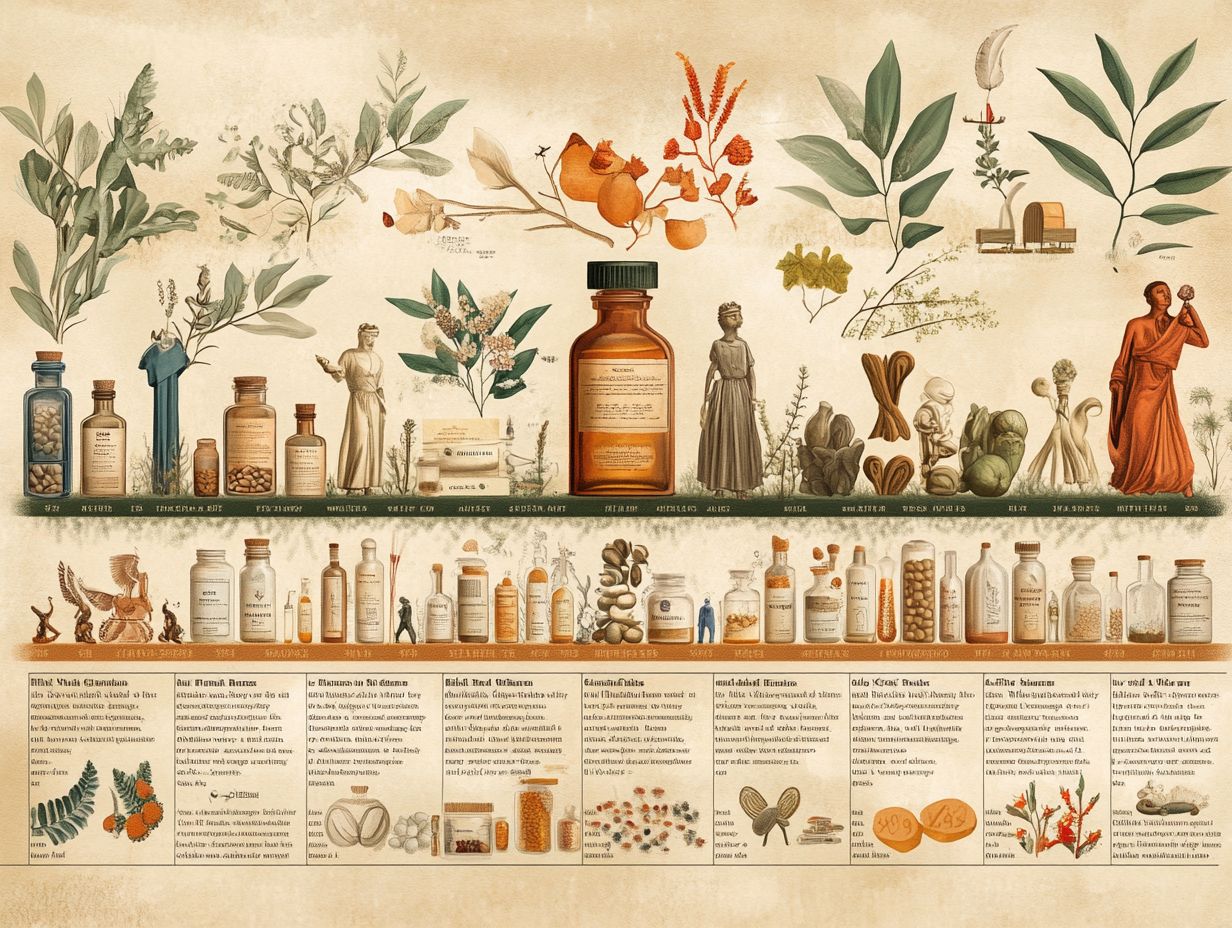The Evolution of Dietary Supplements: A Historical Overview
Dietary supplements have firmly established themselves in the conversations surrounding modern health and wellness. Yet, their origins stretch back through the annals of history.
From the ancient practices of herbal healing to today s thriving market of vitamins and proteins, the journey of dietary supplements is truly captivating. This article delves into the early forms of supplementation and their cultural significance, tracing the key milestones in their evolution. It also explores the diverse types available today.
This article also explores the ongoing controversies regarding regulation, safety, and effectiveness, illuminating what you should know before selecting supplements for your own health journey.
Contents
- Key Takeaways:
- The Origins of Dietary Supplements
- The Rise of Modern Dietary Supplements
- Types of Dietary Supplements
- The Controversy Surrounding Dietary Supplements
- Frequently Asked Questions
- What are dietary supplements?
- When did the use of dietary supplements begin?
- How has the use of dietary supplements evolved over time?
- When did the modern dietary supplement industry begin?
- What major events have influenced the evolution of dietary supplements?
- What to Consider When Taking Dietary Supplements
Key Takeaways:

- The origins of dietary supplements can be traced back to ancient civilizations, where natural remedies and traditional practices were used to supplement diets.
- The rise of modern dietary supplements can be attributed to key milestones and developments in science and technology, leading to a wide range of supplements available today.
- While dietary supplements can provide essential vitamins, minerals, and other nutrients, debates often arise about their safety and effectiveness, with concerns over regulation and misleading claims.
The Origins of Dietary Supplements
The origins of dietary supplements stretch back to the dawn of human history. Various cultures intuitively grasped the vital role of food nutrients in keeping healthy and warding off diseases like scurvy (caused by a lack of vitamin C) and pellagra (linked to a deficiency in niacin).
These conditions were common during significant historical times, like World War II, and attracted the attention of key figures such as President Roosevelt.
Pioneering researchers like Casimir Funk and Elmer Vernon McCollum were instrumental in shaping our understanding of vitamins. They first identified them in the early 20th century, paving the way for the evolution of dietary supplements as we know them today.
Early Forms of Supplementation
Early forms of supplementation often drew from the natural bounty of food nutrients. Ancient civilizations adeptly utilized herbs and plant extracts to elevate their nutritional intake.
These time-honored practices reveal a remarkable understanding of the nutritional value embedded in nature. Various cultures recognized the health and vitality benefits that specific herbs could offer. This foundational knowledge laid the groundwork for modern dietary supplements, as people began to explore ways to optimize their nutrient consumption using the resources available to them.
As food processing techniques advanced over time, the ability to extract and concentrate these beneficial compounds evolved. This gave rise to the diverse range of supplements you see today. This exciting journey from ancient remedies to today’s supplements shows how timeless wisdom shapes our health.
Traditional and Cultural Uses
Traditional and cultural uses of dietary supplements often stem from a deep-rooted belief in their health benefits. Many cultures seamlessly weave specific vitamins and herbal remedies into their diets, aiming to enhance wellness and beauty.
Take the ancient Egyptians, for example. They harnessed oils infused with essential nutrients, not just for their skincare advantages but also to combat vitamin deficiencies caused by sun exposure. In the realm of Traditional Chinese Medicine, herbal supplements like ginseng are highly valued for their capacity to boost energy and overall vitality. This shows how deeply connected nutritional supplements are to cultural rituals.
Indigenous cultures have similarly acknowledged the significance of natural sources for vitamin synthesis, utilizing native plants abundant in antioxidants and essential vitamins. These historical practices reflect a shared understanding across cultures: nutrition is essential for both health and aesthetics.
Understanding these practices is crucial for anyone looking to enhance their health with supplements today!
The Rise of Modern Dietary Supplements
Modern dietary supplements have changed the market. You may have noticed their growing use among many people, especially athletes and health enthusiasts.
This transformation reflects a broader trend towards health and wellness. Staying informed about the latest developments in this expanding arena is essential.
Key Milestones and Developments

Key milestones include the groundbreaking discovery of essential vitamins and their commercialization. These developments have notably impacted vitamin A sales and the overall vitamin market.
These breakthroughs sparked a health revolution! They elevated consumer awareness and set the stage for innovative marketing strategies that highlighted the importance of vitamin supplements in daily diets.
As companies harnessed the power of advertising, they introduced advanced concepts like tailoring supplements to your genetic makeup. This personalized approach ignited consumer interest and fueled demand.
In this landscape, dietary ingredient safety became paramount. Regulatory bodies and companies collaborated to ensure that supplements met rigorous standards. This dynamic market continues to evolve, shaping the future of dietary supplements.
Types of Dietary Supplements
The variety of dietary supplements available today can be categorized into several distinct groups. You ll find vitamin supplements, herbal options, and protein formulations, each offering unique health benefits.
Vitamins and Minerals
Vitamins and minerals are essential for your bodily functions. Deficiencies in vitamins like C and B1 can lead to serious health issues.
These nutrients maintain your optimal health by ensuring that various biochemical processes function smoothly. For instance, a lack of vitamin C can compromise your immune system, while insufficient vitamin B1 can negatively affect your energy metabolism.
Monitoring your nutritional intake is crucial for preventing long-term health complications. Embracing a balanced approach strengthens your physical well-being and enhances your overall quality of life.
Herbal and Botanical Supplements
Herbal and botanical supplements, derived from plants, are celebrated for their nutritional benefits. They often feature clean labels that emphasize transparency, allowing informed decisions.
These supplements include extracts from herbs like Echinacea and Ginseng. Echinacea is praised for its immune-boosting properties, while Ginseng is known for enhancing energy levels.
Turmeric and Ginger are popular for their powerful anti-inflammatory benefits. The scientific support for these health claims varies; some studies report encouraging results, while others call for more research.
As a discerning consumer, understanding ingredients in dietary supplements builds your confidence. Stay informed about government guidelines that regulate the safety and efficacy of these products to make well-informed choices for your health.
Remember, each type of supplement has unique benefits. Choose wisely to enhance your health journey!
Explore the right supplements for your needs today and take a step towards better health!
Protein and Amino Acids
Protein and amino acids are essential elements in dietary supplements. They support muscle growth and recovery, making them popular among athletes and health-conscious individuals.
These nutrients are vital in sports nutrition. They benefit not just bodybuilders, but anyone engaged in various fitness pursuits. They facilitate muscle repair after intense workouts and help you maintain peak performance.
If you re exploring eSports supplements tailored to the unique demands of competitive gaming, protein and amino acids can sustain your energy levels and sharpen your focus during marathon sessions.
With convenient formats like shakes and bars, meeting your nutritional needs becomes easy. You can effortlessly integrate these essential components into your daily routine.
The Controversy Surrounding Dietary Supplements

The ongoing debate about dietary supplements focuses on regulation, safety concerns, and product efficacy. The FDA’s role in overseeing the market is vital for consumer protection.
Regulation and Safety Concerns
The FDA regulates dietary supplements to protect you from unsafe products. However, concerns about the quality and effectiveness of these supplements persist.
You might question the safety of vitamin supplements available on the market. Educating yourself about dietary guidelines can help you understand what you’re putting into your body.
Despite the FDA’s significant role, challenges like misleading advertising and unregulated ingredients complicate your journey through available options.
When a supplement’s integrity is questionable, it puts your health at risk and erodes public trust in the entire dietary supplement industry.
Efficacy and Misleading Claims
The efficacy of dietary supplements is often debated. Many products make bold claims that may mislead you, undermining your confidence in the industry.
Navigating dietary supplement trends can feel like wandering through a maze of marketing messages that often lack scientific backing. Research shows troubling issues with the loss of important nutrients in certain products, making it vital for you to seek clarity.
Misleading claims impact your health choices and erode trust in the market. Following government guidelines helps ensure transparency and protects you from exploitation and misinformation.
Frequently Asked Questions
What are dietary supplements?
Dietary supplements are products designed to supplement your diet. They provide essential nutrients, such as vitamins, minerals, herbs, or other botanicals, that may be missing or insufficient in daily intake.
When did the use of dietary supplements begin?

The use of dietary supplements dates back to ancient civilizations, like the Egyptians, who utilized herbs and plants for medicinal purposes.
How has the use of dietary supplements evolved over time?
The use of dietary supplements has transitioned from traditional herbal remedies to modern vitamins, minerals, and other natural substances aimed at promoting health and well-being.
When did the modern dietary supplement industry begin?
The modern dietary supplement industry began in the 1930s with the production and marketing of synthetic vitamins and minerals.
What major events have influenced the evolution of dietary supplements?
The passing of the Dietary Supplement Health and Education Act (DSHEA) in 1994 and the rise of the health and wellness movement have significantly influenced dietary supplements.
To learn more about dietary supplements and their benefits, consult a healthcare provider or explore further information online!
What to Consider When Taking Dietary Supplements
Thinking about taking dietary supplements? Here s what you need to know! Always consult your doctor before taking any dietary supplement. Some may interact with medications or have potential side effects.
Follow the recommended dosage guidelines and buy from trusted sources to ensure your safety.






